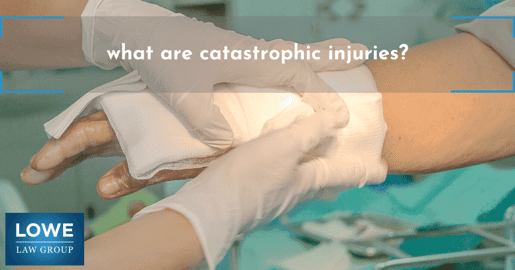 Personal injury cases can be complex for many reasons. When determining the severity of the injury, though, the courts look at some as more catastrophic than others because they can have a long-term impact. You can endure life-long pain, medical needs, and more when you suffer a catastrophic injury.
Personal injury cases can be complex for many reasons. When determining the severity of the injury, though, the courts look at some as more catastrophic than others because they can have a long-term impact. You can endure life-long pain, medical needs, and more when you suffer a catastrophic injury.
You can help your potential case if you recognize the types of injuries the law considers catastrophic. Below, we’ll explain the different types of catastrophic injuries, their causes, and your rights should you suffer permanent disability because of someone else’s negligence.
Catastrophic injuries include, but are not limited to:
To learn more about each of these types of injuries, continue reading or click on one of the injuries above.
Call our firm today at (801) 900-4681 if you suffer a catastrophic injury as a result of negligence.
Traumatic Brain Injuries or TBIs
Traumatic brain injuries are some of the worst that can occur. Even minor injuries such as a concussion can have a significant impact on you, your cognitive and motor functions, and your behavior. You may also suffer a non-traumatic brain injury (acquired) that stems from an infection, which may also result from negligence.
Traumatic brain injuries often involve contact with your head, skull, and brain. For instance, you may suffer a TBI in a car accident. The force of the collision may cause your head to slam against the frame of your vehicle. You may also suffer a TBI in a slip and fall on someone else’s property when you land on your head.
In any case, if someone else’s negligence plays a role in causing you harm, you may have legal rights to pursue compensation. A TBI can impact your ability to maintain a normal lifestyle, secure employment, and require you to receive ongoing medical care. We’ll help you move on in the most effective manner possible after a severe brain injury.
Spine Injuries and Paralysis
Spine injuries don’t always result in paralysis, but the other injuries that may occur are severe as well. Any injury involving your spine can leave you with physical pain and suffering long after the injury occurs, putting you in a difficult position moving forward.
Some spine injuries can impact how you walk. You may be able to walk, but you might require help using specialized medical equipment to do so without encountering problems. A spine injury can also impact your ability to control your bladder and bowels.
In the worst-case scenarios, you may experience paralysis. However, paralysis can come in many forms, each one affecting a different part of your body. Some can cause you to lose control of all four limbs, while others can impact your legs or one side of your body.
Spine injuries can occur because of car accidents (whiplash), slip and falls, medical malpractice, or even acts of violence. Any negligent act resulting in a spine injury allows you to pursue compensation for your damages.
Severe Burn Injuries
Burn injuries may not seem catastrophic because they can happen in your own home. Touching a hot curling iron can cause a burn. However, more severe burn injuries can cause significant pain and long-term cosmetic scarring.
While many may feel that burn injuries are not a result of negligence, history shows us that some companies and individuals may act irresponsibly, leading to someone suffering a severe burn — for instance, the case of Liebeck v. McDonald’s Restaurants.
Stella Liebeck endured third-degree burns after accidentally spilling coffee on her lap. While McDonald’s made the argument that the woman spilled the coffee, Liebeck and her legal team were able to prove that McDonald’s was serving coffee at a temperature too hot for consumption.
Liebeck had to have skin grafting and undergo treatment for two years. McDonald’s had to pay $2.86 million, but Liebeck ultimately recovered $640,000 in a settlement before an appeal. This case proves that significant harm can come from a burn injury resulting from someone else’s negligence.
Amputations or Loss of Limbs
Amputations often occur in medical procedures because someone has an infection or medical condition, and the doctor wants to prevent additional problems from occurring. However, it can also arise because of negligence, such as a car accident resulting in a severed limb.
In any situation, losing a limb is catastrophic and can make it difficult to do daily tasks, work in a specific capacity, and more. In many cases, you may require long-term medical care, treatment, specialized medical equipment, and more.
Other Catastrophic Injuries
Internal organ damage and tissue damage can also receive a catastrophic injury label in situations where these injuries impact your overall functions. In these cases, you must work to determine the cause of the injury — such as infection, trauma, or medical error — to understand your ability to file a lawsuit.
Catastrophic injuries fall under three categories, including physical, spinal cord, and cognitive. The severity of your injury will help to dictate the potential outcome of your lawsuit and the compensation you may recover. However, because these are the most severe types of injuries, the courts often handle them with the care and understanding that they deserve.
At Lowe Law Group, we work hard to help catastrophic injury victims move forward and cover the costs associated with the injury. If you need legal help, our personal injury attorneys are ready to be your guides throughout the process, protecting your rights every step of the way.
Call our firm today at (801) 900-4681 for a free consultation and learn more about your rights to hold a negligent party accountable for their actions.

